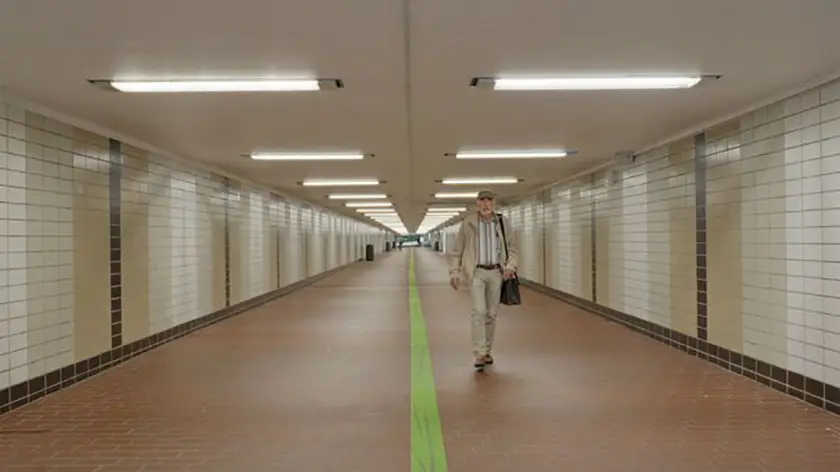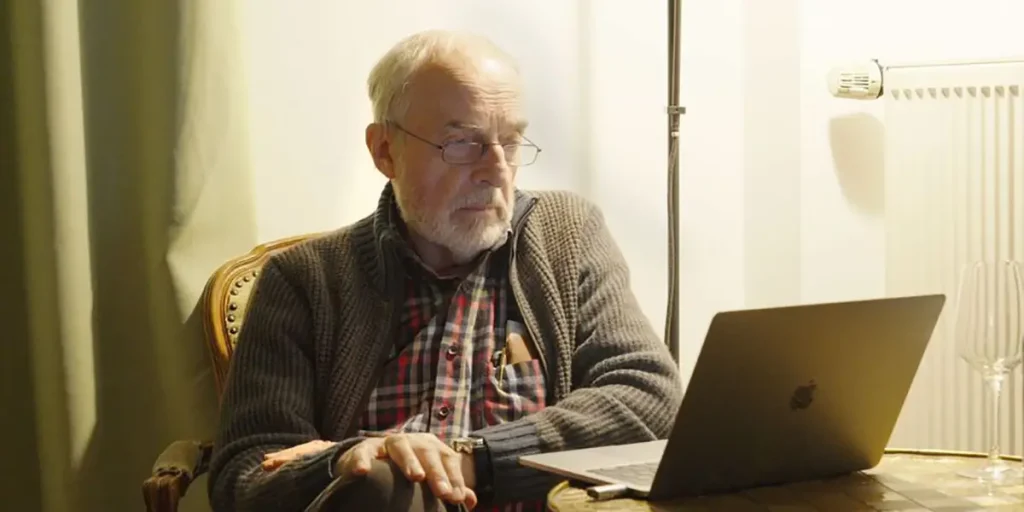Green Light offers an intimate look at the life of a neuropsychiatrist who visits those requesting approval for assisted suicide in Germany.
Director: Pavel Cuzuioc
Locarno Screening: August 13, 2025 (Semaine de la Critique)
Genre: Documentary
Run Time: 101′
Release Date: TBA
Where to Watch: At the Locarno Film Festival
Dr Johann Spittler helps people die. In Green Light, we follow the neuropsychiatrist and his sleepy dog to appointments in which he meets elderly people, people in pain, and people in despair, all of whom have decided that it is time to end their life. He sits across from them, nonchalantly typing away on his laptop, as they explain how they got to this decision.
He assesses their answers and their mental faculties, before giving his verdict: that they may be given the green light to go ahead, or that he cannot, based on the information in front of him, give his approval.
Viewer discretion is advised at the movie’s outset. There are conversations about dying, suicide, disordered eating, abuse. As per Dr Spittler’s process, everyone he speaks to must give honest accounts of how they got to the point of requesting he visit them. They describe great pain, both physical and emotional. But there is also a sense of gratitude, which is what Dr Spittler says keeps him doing this job. Ultimately, he believes he is providing a service that some people are desperate for, and more often than not, they show him great appreciation.
Most of Green Light is devoted to intimate conversations between Dr Spittler and those requesting his help, usually at their homes. Sometimes family or friends are present. A few static cameras unobtrusively listen in as the doctor asks his questions. He speaks clearly and matter of factly, and much louder for his elderly patients. He shows no signs of the momentous responsibility he has. When asked for his opinion by a client, he sometimes withdraws and sometimes speaks freely. He tells one man, who is uncertain of when he wants to die, that ‘it would sadden me deeply to have to assist you; please, please don’t’.
His verdicts are never shown, although a few are implied, but for all the talk of his rigorous assessments, we are not shown what makes someone suitable for assisted dying and who he doesn’t give the green light to. Perhaps these come under doctor-patient confidentiality, but one can’t help but wonder.

Interspersed among these scenes are clips of Dr Spittler giving lectures and of him meeting with lawyers. He has helped a man with a history of schizophrenia die and is facing charges. Director Pavel Cuzuioc was inspired to make Green Light after developing a deep curiosity about the doctor’s immense responsibility. That responsibility is entangled with increasingly confusing legalities. We see Dr Spittler explain what happens after the moment of death in different parts of Germany, showing little consistency across the country. Sometimes, the doctor simply approves someone for assisted suicide. Other times, he is with them. He tells a room how he is able to be part of the process without being liable for someone’s death.
The confusion is the point. For the doctor to do what he does, he has to evade certain laws, yet the end result is still the same. The people he meets are, statistically, the opposite of those who typically die by suicide: they are predominantly women and are on average 68-years-old. Germany, he says, has the highest support among the public for assisted dying in Europe. At one point he says, ‘I can assert that ethical proclamations cannot change circumstances’. He lives a practical life as part of a society that agrees with what he does in theory, but in which the legislation is a minefield. Some blind eyes are clearly being turned, but – as with the charges brought against him – there are still some hard lines.
Late in Green Light, Dr Spittler tells a patient of his belief that every living thing carries within itself the mission to live. Of another he says: ‘I’m despondent that therapy doesn’t help and someone like her is leaving us’. Opponents of assisted dying often argue that efforts ought to be directed towards greater healthcare instead. What’s most impressive about Cuzuioc’s film is how it never comes down on one side or the other, focusing instead simply on what is happening, whether you like it or not. It is an invitation into highly private and delicate moments as people choose to end their life. Watching it, you witness a part of someone’s life – the end – often reserved for only those closest to them.
Green Light (Locarno Film Festival): Movie Plot & Recap
Synopsis:
An intimate documentary following Dr Johann Spittler, a German neuropsychiatrist, as he assesses people for assisted suicide.
Pros:
- Intimate invitation into a highly private part of life
- Fascinating central figure
- Refreshingly unbiased
Cons:
- Confusion over the legalities and how the doctor operates
- No one is shown being denied approval
Green Light had its World Premiere at the Locarno Film Festival on August 13, 2025. The film will be screened again on August 14.

